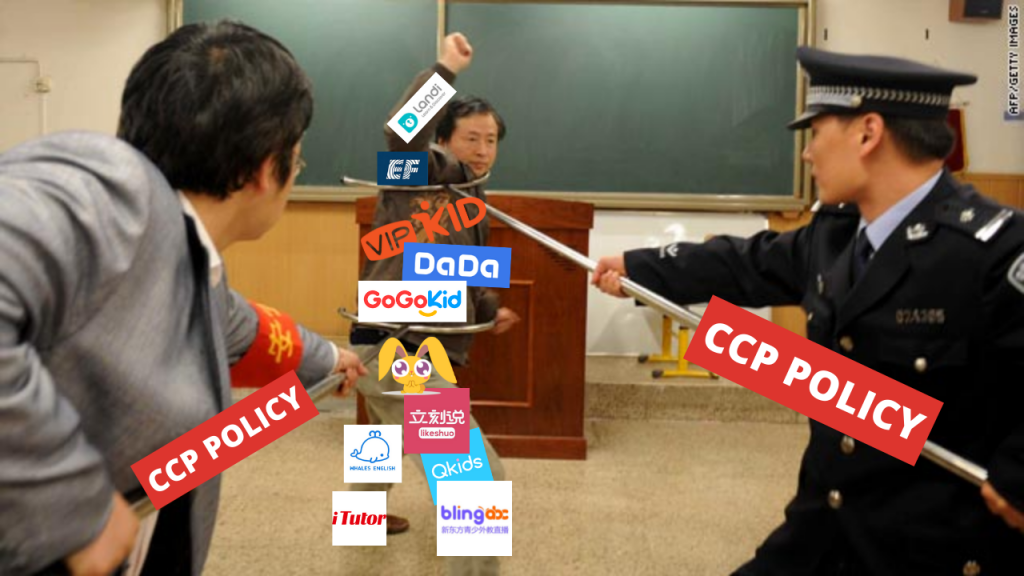Am I fired? What does the future hold for the Online ESL industry in China?

Am I fired? What does the future hold for the Online ESL industry in China?
The rumors have been circulating for a while now. Brief ripples in online ESL groups along with the usual, “Which online schools are the best?” “What kind of headset do I need?” and the ubiquitous debate on native vs non-native teachers (yawn).🥱🥱🥱
Then on 20th July 2021, the tidal wave finally hit, and I like millions of other online ESL teachers stared at the headlines and asked myself the same question,
“Am I fired?”🔥🔥🔥
One of the fastest-growing industries worldwide, employing teachers from all over the world, the private tutoring industry in China is worth $120 billion with over 75% of students aged from 6 to 18 attending after-school tutoring classes in 2016, according to the most recent figures from the Chinese Society of Education. Faced with a declining birth rate and an aging population, the Chinese government is looking for ways to increase their young population, implementing a three-child policy in May this year. However costs of raising children in China have spiralled in recent years, prompting the Chinese state council to issue a policy known as the 720 policy. (Incidentally, The Chinese State Council serves an administrative role. It issues policies not laws. How these policies are interpreted and implemented may well vary from region to region.)
Tiger Moms and Chicken Babies.🐯🐯🐯
One way to lessen the financial pressure on families is to reduce spending on private, after school tuition. In China, the Tiger mom is legendary as parents compete to have the best educated children, cramming their brains and their schedules with extra-curricular activities. These children are known as “Jiwa”, or “chicken babies”, refers to them being pumped full of energy rich “chicken blood”, in the form of after school tuition, to ensure they get the best possible start in life.
Let`s take a closer look at the possible new measures and how they could affect you. 🔍🔍🔍
The 720 Policy📙
- The 720 policy states that Curriculum-based tutoring institutions must register as non-profit organisations and are therefore prohibited from initial public offerings on capital markets meaning investors will no longer be able to invest in the private education sector.
- Online classes should last less than 30 minutes and finish no later than 9pm.
- A proposed increase in public resources and a subsequent reduction on the role of private education providers being used as after school childcare. Schools will be expected to provide after class services to fit in with the needs of working parents.
- More regulation of extracurricular training activities so that it is not reliant on education/ materials from overseas.
- Extracurricular activities should not take up student holiday or weekend time. There is also a proposed ban on the hiring of non-Chinese nationals from overseas.
- Complete prohibition of online training for children below the age of six or seven.
What happens next?⏭️
The proposals will initially be piloted in nine cities and provinces, Beijing, Shanghai, Shenyang, Guangzhou, Chengdu, Zhengzhou, Changzhi, Weihai, and Nantong with the expectation that they are rolled out to other areas after 12 months.
The Good News 👍
To date, any new measures have yet to be published and online education companies state that they have yet to receive official notification.
If the measures are written into law, the new rules may be open to interpretation, for example the 720 policy applies to institutions registered in mainland China, so the impact of any new laws may depend on which platform you work for, its legal identity, where and as what they are registered and from what country the teachers are paid.
The Bad News 👎
The online ESL industry in China is going through some changes, and it is likely that we, as online ESL teachers will be effected to a greater or lesser degree. It is unlikely that we will all continue teaching the same classes on the same platforms in the same volumes as we are now, but also unlikely that we will all find ourselves jobless and the entire industry will cease to exist overnight. As with most things in life it is likely to be somewhere in the middle.
So what do we do now? In such uncertain times, it is difficult to make a definitive plan, but there are a few things you can do to be prepared for all eventualities. Here are a few ideas.
Keep on Keeping on! Show up for work, be punctual, be professional, dress smartly, be great at your job! If there is a cut in jobs or a hiring freeze, those are the teachers that the companies will want to stick around.
Diversify.💃
It`s never a bad thing to have a plan B, especially in these days of global uncertainty. Sometimes a shake up is what`s needed to force us out of our comfort zone and make us take a breath. It could be something you`ve always wanted to do, like teach something different, train in a completely different field or start your own business. Within the ESL sector, it`s worth bearing in mind that English is still needed by billions of people around the world be it online or in bricks and mortar schools.
Branch out on your own.🌲
As I may have already mentioned, English, whether you like it or not, is the international language. It is the language of business, technology, and communication. There is a reason why the online teaching industry is worth billions of dollars a year. There are still plenty of people in China and around the world that want and need to learn English and if the big online platforms are prevented from filling that gap, who will? Although it’s a steep learning curve and a big jump from teaching for an online platform, this could be the opportunity you`ve been waiting for to flex your entrepreneurial muscles, create your own platform and branch out on your own.
In Conclusion 🔚
This is the part where I feel like singing, “I will survive!” But I promise I won’t! What I will say, is that for now at least, nothing is certain. I hope this article has helped to straighten out some of the facts, dispelled some of the myths, allayed some of your fears and given you some options to think about for the future. And whatever happens next in the rocky world of online English teaching, I wish you all the very best!
Blog By Claudia Olca.






Responses